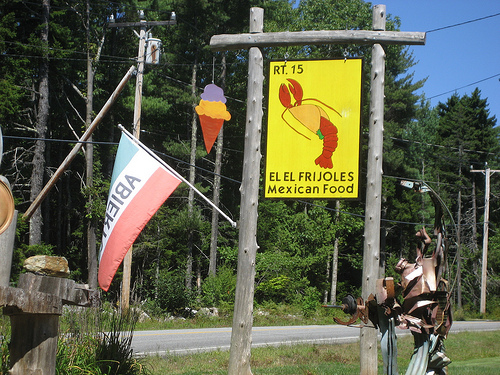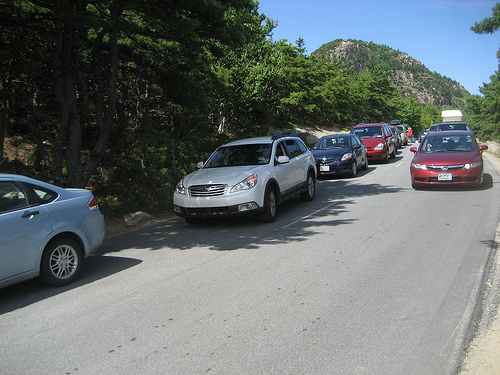History’s Greatest Monsters
Portland Press-Herald picks up an AP story with a local angle:
A Maine man who was injured after police say he leaped from the upper deck at Long Island’s Jones Beach Theater has pleaded not guilty to reckless endangerment and disorderly conduct charges. Luke Duplessis was released without bail following his arraignment today in Hempstead, N.Y. Dan Russo, a Long Island-based attorney for the 30-year-old Old Town, Maine, resident, disputed allegations that his client jumped, saying he accidentally fell.
Duplessis landed in a seating area about 25 feet below during intermission of an Aug. 18 concert by the jam-band Phish.
Isn’t attending Phish shows the real crime here?
- Comments
- 19
The Deadliest Occupations
Looks like the great state of Maine has a high proportion of people employed in the two deadliest lines of work:

Specific Maine numbers for 2009 are still being reviewed by the state Department of Labor, but department spokesman Adam Fisher said the fishing industry accounted for approximately half of the 16 workplace fatalities in Maine in 2009. A final state report for last year is expected late next month.
I think it’s relatively easy for people to overlook the extent to which the long-term transition of employment into the service sector is good for public health and worker safety.
Heavy Metal
Not-so-scenic sign in the Holbrook Island Sanctuary:

The park is very nice, however, if a bit weird. The Goose Falls Trail was lovely and quite easy, but the Beaver Flowage Trail is considerably less scenic.
El El Frijoles
At the suggestion of a Twitter follower, I went with Kate yesterday to have lunch at El El Frijoles in Sargentville, the Blue Hill Peninsula’s first taqueria:

I had some lobster tacos that make an interesting alternative to the traditional lobster roll. Great chips and salsa and some excellent beans as well. Kate had a pollo asado burrito that she liked a lot. The name is a joke—LL Bean, get it?—part of the trend in which 50 percent of Maine businesses have a lame pun as their name.
Scandal-Free Stimulus
An important observation from Time’s Michael Grunwald:
So far, despite furor over cash it supposedly funneled to contraception (deleted from the bill) and phantom congressional districts (simply typos), the earmark-free Recovery Act has produced surprisingly few scandals. Prosecutors are investigating a few fraud allegations, and critics have found some goofy expenditures, like $51,500 for water-safety-mascot costumes or a $50,000 arts grant to a kinky-film house. But those are minor warts, given that unprecedented scrutiny. Biden knows it’s early — “I ain’t saying mission accomplished!” — but he calls waste and fraud “the dogs that haven’t barked.”
I think that’s true and it’s crackerjack politics. At the same time, rapid economic recovery and employment growth are better politics. And it’s worth noting that the Obama administration’s obsession with avoiding waste and fraud in American Recovery and Reinvestment Act spending has arguably been counterproductive policy.
After all, what you’re ideally trying to do with stimulus funds is mobilize genuinely idle resources to go do something useful. But that can be a bit tricky. And as a second-best alternative, as long as the resources you’re mobilizing are genuinely idle then you’re helping to fight the recession even if your initiative isn’t all that useful in a conventional sense. Almost nothing is totally useless, and the mobilizing of resources will raise incomes and therefore demand for whatever it is that the market determines the income-earners want. But this can easily look like “waste.”
The other thing is that it’s obvious to everyone in a private sector context that the costs of fraud-prevention sometimes exceed the costs of fraud. At CAP, for example, there’s no system in place to prevent people from using the office printer for personal activities. Similarly, you can just walz into the copy room and poach some envelops. And, indeed, fraud and abuse of this sort do take place. But while it wouldn’t be beyond the intellectual capacity of CAP’s senior leadership to design a system to prevent this, preventing the fraud and abuse wouldn’t actually be worthwhile. If you try to do 100 projects well and quickly, you might find out that only 90 of them actually get done well. That might be ten instances of waste. But if the alternative is to avoid all the waste but only get 70 projects done at medium speed, that might be worse.
Better DMVs Needed
Most middle class people have relatively few direct interactions with the government, and consequently I think it’s more important than people generally realize to try to improve the quality of those interactions. Keith Humphreys observes, for example, of a recent trip to the Department of Motor Vehicles:
Like most DMVs around the country, this one set its weekly hours to correspond with the times when most Americans are at work and cannot go to the DMV. As a small concession to serving those whose taxes pay for the DMV to exist in the first place, this office was open on Saturday mornings from 8am to noon. I arrived at 7:30am to avoid a line. Too late: it already snaked back a hundred feet and around one corner of the building. By the time 8am rolled around, it wrapped back several hundred yards until people were standing next to, you guessed it, the protestor, who got a receptive audience as he railed at the government.
The last time I went to the DMV, I was able to go during a non-peak hour and found the whole experience to be totally painless. But obviously that’s not an option for many people. And it could be easily changed. The DC DMV’s Southwest Service center is open 37.75 hours a week with its Tuesday – Saturday, 8:15 AM – 4 PM schedule. Suppose instead it was open Saturdays and Sundays from 11AM to 5PM, plus 6-9PM on Wednesday and Friday and 7AM-10AM on Tuesday and Wednesday. I bet that would be more convenient for the vast majority of DC residents. And it would only be 24 hours per week worth of salaries and the hours you’d be asking people to work would hardly be all that odd.
El-Erian
I wonder what the informational content of an op-ed by PIMCO’s CEO about how we shouldn’t rely on additional monetary or fiscal stimulus to revive the world economy is supposed to be. After all, if there’s a clash between what policies would be good for PIMCO’s investment positions and what policies would be good for the global economy, El-Erian has a responsibility to push for policies that would be good for PIMCO’s investment positions. Is there such a clash? Well, readers of The Washington Post op-ed page have no way of knowing. So what’s the point of publishing it?
Parking Mandates in Toronto
New zoning code for Toronto’s largest city: “Council also adopted common parking standards, cutting up the city into five categories. New buildings that go up near subways or streetcars will now require fewer parking spaces than those that are far from rapid transit.”
The tragic thing is that this counts as a progressive, forward-thinking reform. Lower parking mandates near transit nodes! But why should there be any mandatory parking near mass transit stops? For that matter, why should there be any mandatory parking far from transit stops? Of course common sense says that if you’re building a house or an office far from mass transit you’re going to want some parking, but why not let the market decide how much is needed? And near transit this is even more pernicious. It’s entirely possible that the most economically efficient use of transit-adjacent land is to build some zero parking structures—to say nothing of ecological efficiency.
The Other Fort Knox
There’s no gold at Maine’s Fort Knox, it’s just a defensive fortification to protect the coastline:

The real punchline of this lovingly preserved historical site, however, is that . . . no historical events of any kind occurred here. No battles. No nothing. Troops were never even really sent to staff it. It was built, it’s a great example of the fortification architecture of the period, and it features really great views. But nothing happened. At all.
Definitions are Important!
A lot of crazy stuff is being said this week about monetary policy, perhaps none of it crazier than this WSJ op-ed:
But deflation and inflation predictions could both be right in a sense, if you aren’t too fussy about strict definitions. In the late 1970s, the last time Americans suffered from manic interventionism from Washington, we had “stagflation,” a combination of minimal economic growth and double-digit inflation. It wasn’t pretty.
By the same token, a round square is possible if you allow the definition of “square” to include circles. However in the 1970s the price level was increasing rapidly (i.e., inflation) whereas “deflation” means a decrease in the price level. If you don’t use words properly, you wind up talking nonsense. Being fussy about strict definitions is a good idea.
Old and New
The bridge over the Penobscot River near Bucksport started suffering from corrosion that imperiled its structural integrity, so as of the past three and a half years there’s been a new bridge. But they didn’t take the old bridge down or anything:

I suppose disassembling an old bridge might be seen as a waste of time and money. But still it strikes me as slightly odd to just leave an old broken bridge standing there crumbling.
Casket Licenses
Benedictine Monks at St. Joseph Abbey started making hand-crafted caskets after Hurricane Katrina knocked down a large portion of a pine forest they own. But it turns out they didn’t count on the coffin cartel:
But now, local funeral directors are trying to put a lid on the monks’ activities. The state funeral regulatory board, dominated by industry members, is enforcing a Louisiana law that makes it a crime for anyone but a licensed parlor to sell “funeral merchandise.” The morticians are serious. Violators such as the monks can land in jail for up to 180 days.
You can understand a public health concern with certain aspects of working with dead bodies, but casket-making doesn’t fit the bill. And once again you see that a board dominated by industry insiders becomes more about reducing competition than anything else. The story’s in the papers because the libertarian Institute for Justice is helping the monks with a lawsuit, but the view that public policy should encourage rather than discourage competition is one progressives should be able to easily embrace.
Suing National Parks
It seems the reason National Parks act like they don’t fear lawsuits is that the Federal Tort Claims Act, while nominally waiving sovereign immunity, states that the government may not be sued for decisions relating to the “exercise of a discretionary function” which covers a wide ground:

America’s litigation-happy culture has some bad effects, but fundamentally access to the courts is a vital aspect of our system—one of the few ways people have of keeping corporate malfeasance in check. But that looks different when you’re talking about suing public entities, so this seems like the right outcome to me.
Castine Civil War Memorial
A statue dedicated to those who died in the War to Preserve the Union dominates the lovely town square of Castine, ME:

The lovely and talented Kate Crawford, with whom I’m traveling, is a Texan by birth and had never heard of this particular conflict. Fortunately, the Castine Historical Society is right nearby and able to fill her in on the limits of her Confederate education.
The Ancien Regime
John Quiggin on the collapse of postwar Keynesian prosperity:
There’s a tiny element of truth in this – after the oil shock, the collapse was rapid and disorderly. But the Keynesian economic order had already broken down by October 1973, and the oil shock was a consequence of that breakdown, not a cause.
An inflationary upsurge had been going on for five years or moe by the time OPEC oil ministers met in October 1973. The term ‘stagflation’, apparently coined in 1965 by Iain MacLeod was in widespread use, to reflect the breakdown of the historically observed Phillips curve relationship between unemployment and inflation. Wage and price controls had been imposed in the US in 1971, but had broken down by early 1973 – the oil shock merely administered the coup de grace, leading to the final abandonment of controls.
Internationally, the Bretton Woods system, based on fixed exchange rates tied to gold by way of a fixed $US price of $35/oz had been under pressure since 1968. The Smithsonian agreement of 1971 was the last attempt at rescue, and the system had collapsed completely by February 1973, although it took a decade or so for the remnants of the associated regulatory architecture to be cleared away by the process of financial deregulation.
More interesting stuff at the link.
Germany Versus Facebook
For the “I appreciate what you’re trying to do but this is unworkable” file, Germany seeks to ban employer use of Facebook in hiring decisions:
The bill would allow managers to search for publicly accessible information about prospective employees on the Web and to view their pages on job networking sites, like LinkedIn or Xing. But it would draw the line at purely social networking sites like Facebook, said Philipp Spauschus, a spokesman for the Interior Minister, Thomas de Maizière.
We’re going to need some kind of shift in norms and not just legal efforts to hold back the tide of digital information.
The New Normal
I was thinking today that the Maine economy doesn’t seem especially depressed, at least not here in the Blue Hill Peninsula. But of course it’s best to look these things up. When I saw the numbers I thought “yup, Maine’s unemployment rate is quite a bit lower than average.” And yet Maine’s unemployment rate is 8.1 percent. If in January 2009 you said to Barack Obama and Ben Bernanke “implementing your policies will lead to an 8.1 percent unemployment rate in July 2010″ I think they’d both have said “that’s not good, we try some more robust policies.” And yet here we are with 8.1 percent unemployment looking not-so-bad.
Twitter Circa 1882
The aforementioned Castine Historical Society has a small-but-excellent museum that features, among other things, this Twitter-esque feature from an 1882 edition of the local newspaper:

An “Alabama Award” pertained to the settlement of some US legal claims against Britain having to do with the Civil War. I suppose if the Great Powers of the 1860s had today’s attitude, they would either have reasoned that the Confederacy was a potential safe haven for terrorists and thus forceful intervention on the Union side was needed, or else that Jefferson Davis was a heroic freedom fighter and thus forceful intervention on the rebel side was needed. “Wait and see and mostly focus on other things” wouldn’t be on the menu.
America Cleaning Up Corruption in Afghanistan By Putting Corrupt Officials on the Payroll
Filkins & Mazzetti: “The aide to President Hamid Karzai of Afghanistan at the center of a politically sensitive corruption investigation is being paid by the Central Intelligence Agency, according to Afghan and American officials.”
As the authors write, their story “underscores deep contradictions at the heart of the Obama administration’s policy in Afghanistan, with American officials simultaneously demanding that Mr. Karzai root out the corruption that pervades his government while sometimes subsidizing the very people suspected of perpetrating it.”
Parks and the Law
Kevin Drum writes about the US-European lawsuit gap. I was thinking about this a bit at Acadia. How is it that kids can just run around on granite cliffs where there’s obviously a very real possibility of falling in a way that causes death or serious injury?

I’m not complaining—it’d be a shame if people weren’t able to wander those rocks and see the views. And as best I can tell, all the kids around were being well-monitored and reasonably sensible. But it seemed so out of character for America. I’m always being told that playgrounds can’t have monkey bars anymore for fear of lawsuits. How does running on wet rocks leading to sharp cliffs fit into that? Has congress granted the National Park Service some kind of immunity from lawsuits? I couldn’t seem to google up the answer, but I bet someone out there in readerland knows the answer.
Infrastructure
If you drive from Washington, DC to Brooklin, ME you certainly won’t feel like you’re driving through a country in which there are no potentially useful infrastructure projects that could be undertaken during the several-year period of elevated unemployment that we’re now projected to face. For example, there’s the bridge from New Hampshire to Maine: “The application says the bridge is ’structurally deficient’ and ‘functionally obsolete’ and has a weight limit of three tons.”
And that’s to say nothing of ideas that are a bit more forward-thinking than roads and bridges—new electrical grid, GPS-equipped buses that display arrival times at stops, supertrains, etc.
Tidal Power
As of this week, the state of Maine is home to the largest ocean tidal generator in the United States. The pilot project currently charges the batteries of an electrically powered Coast Guard search and rescue boat.
Traveling With Stuffed Animals
According to a study that looks a bit methodologically suspect to me, one in four adult men travel with stuffed animals. For my part, my apartment is home to four stuffed pandas (the softer side of Matt Yglesias) but I don’t generally travel with them. The exception, such as it is, is that I picked up Panda #4 (aka “Mr Tung”) in China and thus had to travel with it for part of the trip.
Partisanship and Democracy
Jamelle Bouie on the bipartisanship fetishists:
Masket only hints at this, but there seems to be a real anti-democratic undertone to the Beltway fantasy of perpetual bipartisanship. Think about it: In the bipartisan fantasy land of Mark Halperin or David Broder, elected officials would ignore their constituents in favor of a “bipartisan agenda” defined entirely by a handful of elite opinion writers. For members of Congress, political loyalty would extend as far as themselves, and you would see a steady disregard for grassroots groups and other outside actors. Politics would have far fewer avenues for citizen participation, and voters would completely tune out, as they could never expect to see their votes reflected in policy.
I wrote on this theme for the Atlantic in the spring of 2008:
For veteran Washington hands—wheelers and dealers in the lobbying game or at the major interest groups—the new system is worse than dull. It’s emasculating. This is why political elites find polarization so distasteful. In a polarized world, elections and procedural rules largely determine policy outcomes; there’s little room for self-styled players to construct coalitions on the fly, and enhance their own power in the process. The growth in the lobbying industry might seem to belie the point, but consider Tom DeLay’s post-1994 “K Street Project”—which pressured lobbying firms who wanted access on the Hill to hire more Republicans—or the swing of the pendulum back after the Democratic takeover in 2006. Power in Congress is firmly in the hands of the party leadership; lobbyists become less powerful, not more, in a polarized system.
But for voters, the boring new ways can be looked at in another way—they’re straightforward. Elections have a predictable and easy-to-understand relationship to government action. Electing a Democrat means, on the margin, more spending on the federal safety net and more government regulation, while electing a Republican produces policies more favorable to business interests. You don’t necessarily get everything you want (ask any liberal disappointed by the continued flow of funds for the Iraq War), but at least on domestic measures, things move predictably.
As I detail in the article, in the less-polarized fifties and sixties the relationship between election results and policy outcomes was very murky. It’s not something to be idealized.
The High Cost of Free Parking
Parking at the various scenic attractions of Acadia National Park is “free” with the price of admission, even during the high summer tourist season:

And yet space is limited. The result—shortages. At a park, this is perhaps all for the best, the general chaos is part of the fun. But there’s no reason we should run our city streets this way.




